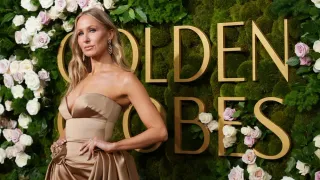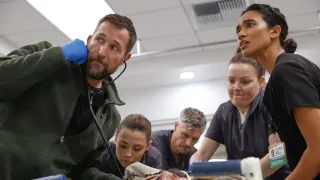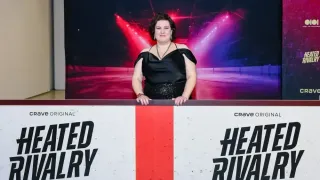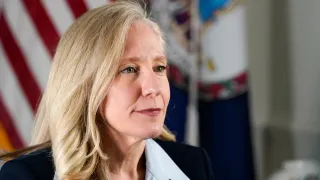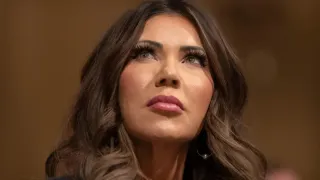August 8, 2016
Fascinating People :: Warren Rochelle
Kilian Melloy READ TIME: 14 MIN.
Everybody loves a "Boy and His Dog" story. But how about the story of a boy and his werewolf... or vice versa?
That's the relationship at the crux of gay fantasy author Warren Rochelle's forthcoming new novel, which is titled -- aptly enough -- "The Werewolf and His Boy." Like Rochelle's three earlier novels, "The Werewolf and His Boy," slated for publication next month, has an LGBT sensibility -- it also is set in an alternate universe, where religious conservatives have made America into a de facto theocracy. But in this case, the worries of the pious reflect actuality: There really are such things as witches, demons, and other supernatural entities, many of them the vestiges of long-ago encounters between human beings and gods.
It's time for some full disclosure. Over the years I have reviewed Rochelle's works, including his novels "Harvest of Changelings" and "The Called," a pair of novels that follow the adventure of a polyamorous foursome of fairies who turn out to be denizens of a parallel universe. (The way they are treated in our own mundane reality -- by more theocratic bullies, and in an America seized by a religious fervor to weed "the Garden" of God's blessed land through spasms of violence -- forms the backbone of the two books.)
After our earlier discussions, Rochelle named a character in his new novel after me: Dr. Kathleen Melloy is a good witch, a fearless defender of her friends and a bibliophile. That brought a smile to my face (who wouldn't be flattered?) but it also posed the problem of a potential conflict of interest.
Which is why I've included this new interview with Rochelle in my column space. Another reason: In the course of our discussion, we got to chat a little, writer to writer, about the utility of both fantasy (his genre of choice) and science fiction (mine) for social commentary, and take note of the different possibilities that each genre makes possible to the author.
In "The Werewolf and His Boy," two young men -- one a "pet" (in this case, that turns out mean he's a werewolf) and one a "godling" (he has the DNA of an honest to... er... gods divine being in his lineage) meet up and fall in love. The fact that one of them is from a highly religious family and they live in a superstitious, homophobic America (not so different, actually, from reality -- especially given that the book is set in the recent past) means that their romance will be fraught with complication and difficulties. But add into the mix the watchful presence of a lethal cadre of demonic beings determined to squelch their growing attachment, and you have an epic in the making.
But no spoilers here! Suffice to say, Rochelle has devised a taut adventure that, like his earlier books, combines erotic self-discovery and high stakes. But let's allow the author tell the story himself... Dear readers, the fascinating Warren Rochelle!
EDGE: I've never had a character named after me in a novel before, as you have done with Dr. Melloy, so first of all let me acknowledge that up front, thank you, and tell you what a thrill that was.
Warren Rochelle: You are very welcome! Every now and then I like to borrow friends' names. For "Werewolf" I also borrowed at least two houses that, alas, fell afoul of the Watchers and got torched.
EDGE: We have had one or two interviews in the past, talking about "A Harvest of Changelings" and "The Called," books that were similar in some ways to "The Werewolf and His Boy." Each of the books is a blend of the sexual and the magical, with healthy doses of social commentary thrown in. In some ways, these books all balance fantasy and eros against a chilling vision of what it would mean to live in an America that has succumbed to theocracy. Is the specter of our democracy -- well, plutocracy now -- giving way to a theocracy something that deeply concerns you?
Warren Rochelle: Yes, I am deeply concerned by all that is happening now in America: The rise of Donald Trump and the support he has received from so many, the ongoing assault against civil rights for GLBT people in the name of religious freedom, the resurgence of racism and extreme rightwing religiosity -the list goes on.
I understand that some of what is happening is a backlash against and resistance to the enormous cultural changes that are in process. For example, it was just a few years ago that a sizable majority of Americans opposed gay marriage. The speed of the shift from opposition to support has been stunning, and for many, terrifying. But the backlash is ugly and mean and dark and, perhaps even more terrifying, many truly believe that such changes are wrong and many of these believers are good people.
These next few years are going to be scary.
EDGE: When it comes to gay fantasy, you do quite well at folding in the sex and relationship elements together with the magical elements. Am I mistaken, or did pre-Christian religions tend to regard sexuality itself as being somewhat magical? Did we lose our honest and healthy appreciation of sexuality through the same means that we lost a sense of the world being a magical place? Are these some of the things you're trying to bring readers back to in your work?
Warren Rochelle: Did pre-Christian religions tend to regard sexuality as something magical? Good question and the answer seems to be murky. Pre-Christian religious views on sex and sexuality covered a lot of territory from being negative to "the belief that sex is the highest expression of the divine." According to Margot Adler in "Drawing Down the Moon: Witches, Druids, Goddess-Worshippers, and Other Pagans in America," "There were pre-Christian pagan ascetics with anti-sex attitudes" and "many ancient pagan religions [that incorporated] sexuality into ecstatic religious practice."
Jesus didn't say much about sex, especially negative things. He seemed to be against excess and adultery and to disapprove of divorce. He "maybe approved of celibacy for those who were capable of it." All of this is open to interpretation and we can blame Paul for the "basis of Christian attitudes we have now on sex."
But tantric sex, which is now associated with New Age practices and Western takes on Hinduism and Buddhism, is very old, as are associations of sex and magic. A lot of Western reinterpretation seems to have started in the 19th century.
Did we lose our honest and healthy appreciation of sexuality the same way or through the same means that we lost a sense of the world as a magical place? I don't have a definite answer, but they seem connected. We do seem to be afraid of the body and we are not comfortable with mystery-which includes the magical.
I didn't set out with the idea of the bringing reader back to the world as magical in my fiction, but as I look back on my work, I find myself again and again coming back to the intersection of the magical and the mundane and that the idea that there are things we can't explain using rational methods. Love is powerful and there is energy and power in our expressions of love. Sex and sexuality is an essential part of being human, and I think we sometimes forget that.
So, the answer to your question as to if I trying to bring readers back to an honest and healthy appreciation of sexuality and back to a sense of the world as magical, is sort of. I say that because these themes and ideas grew in the telling and weren't really planned, especially in the first few drafts. In revision I can and do recognize and focus on and sharpen such themes and ideas.
EDGE: "The Werewolf and His Boy" centers around Jamey, who is a "godling," and Henry, who is a "pet" -- specifically, a werewolf. The book doesn't delve into too much detail about what it means to be a godling or a pet, but I gather that the "godlings" are the distant descendants of supernal (or alien?) beings who visited Earth long ago and have since gone on to some other place, leaving all sorts of magical creatures in their wake. Will there be a sequel to elaborate on the back story?
Warren Rochelle: I got the idea for the godlings from the Nephilim, who are "the offspring of the 'sons of the God,' and the 'daughters of men' in Genesis 6:4." So, you are right: Godlings are the descendants of these powerful beings.
It is somewhat ambiguous in "Werewolf" if they are divine or alien. These beings - the old ones or the old gods - came here to escape trouble they caused elsewhere. While here they tinkered, and made the Pets, whom they left behind when they went on. They also left behind the godlings, who have special powers and abilities, and they made Watchers, too, and left them behind with an assigned task.
Yes, I am planning on a sequel, maybe two, and the reader will learn more about the back story and who these old gods really are.
EDGE: If there is to be a sequel, is that why you set "The Werewolf and His Boy" in the 1990s? So that the sequels could then work up to the present time?
Warren Rochelle: "Harvest" was set in 1991, and "The Called" in 2012.
"Werewolf" is set in 2009. The sequels to "Werewolf" are to be set in 2010 and 2011, which sort of brings them up to the present time. But, all of my books are set in alternate universes that are very similar but still different from the real world.
These different universes are parallel to ours. Doing this lets me, for example, set up a world in which cell phones, computers, and the Internet aren't ubiquitous, but are very controlled and expensive. Both boys have been taught to fear such technology, especially Jamey. Unlike their real-life peers, Henry and Jamey are not media-saturated. The Watchers have been working for millennia to suppress and limit access to knowledge of any kind, let alone magic. They are very afraid of what could happen if anyone could access to the Internet
That they are parallel lets me have the stories be sort of commentaries on the present.
EDGE: What are "pets," by the way? Different sorts of were-creatures? Beings created by the gods as experiments? Or as cute companions, the way we regard our pets?
Warren Rochelle: The Pets, which the gods made, include such creatures as werewolves, selkies, and other weres, and pans, centaurs, mers, and other mythical beings. They also made creatures we would call monsters, such as dragons. They made vampires, too, but the Watchers exterminated them some time ago.
Initially the Pets were experiments but they became cute companions, like our pets.
Witches, by the way, were not made by the old gods but have always been a part of humanity.
EDGE: Various elements in "The Werewolf and His Boy" felt like they could easily link back to "A Harvest of Changelings" and "The Called." Do the books all share a common universe?
Warren Rochelle: The universes are similar, but they aren't the same. "Harvest" and "Werewolf" have different histories.
EDGE:If the books did share a common universe, would we ever expect Henry and Jamey to become involved with other life partners, the way the foursome in the "Changelings" books -- three men and a woman -- were involved with each other? Or are only fairies polyamorous? ;-)
Warren Rochelle: Interesting idea... I don't think polyamory is only practiced by fairies or the magical, no matter the universe.
EDGE: I certainly hope not!
"The Werewolf and His Boy" is much more overt when it comes to the "Watchers," magical demon-like creatures that police the world and suppress the knowledge of things like magic. The Watchers make for great villains! They are totally dedicated to their cause and utterly convinced of the necessity of what they do -- they're not evil just for kicks. In fact, they are kind of working stiffs.
Warren Rochelle: The Watchers do occasionally take pleasure in inflicting human suffering, but for the most part, doing so is just part of their job, collateral damage, as it were. Their job, to suppress the knowledge of magic and the magical and thus keep secret the Pets' existence, was encoded into their DNA.
I like it that as dedicated as Watchers are to their cause and as convinced of the necessity of what they do, that sometimes there are doubts as their human influences do persist and cause problems. Poor Ronan!
EDGE: What I particularly like about your social commentary is how it takes place in the margins of the story -- Jamey being afraid of computers because he's been taught they are "evil," and tools of Satan, for instance. Even in the "Changeling" books, in which society has been much more seriously impacted by theocracy and anti-gay religious teachings, the focus remained on the characters and their journey, and I think it was a wise choice.
Warren Rochelle: Thanks. I find character-driven fiction much more engaging than idea- or plot-driven fiction. I also think that social beliefs and customs are often revealed in small ways, in those margins you mentioned. We don't often know that what we accept as normal is something that we have been taught and really is something we can change or choose.
EDGE: As a writer, I tend toward science fiction, where once again it's possible to address all sorts of social questions in fantastical settings. But fantasy -- using magic instead of high technology, and demons and imps and gods instead of extraterrestrials -- can look at questions of sexuality, family structures, prejudice, and related issues -- in ways that science fiction cannot. What draws you to the fantasy side of storytelling?
Warren Rochelle: I do occasionally write some science fiction (I love alternate history), but yes, mostly fantasy. One practical reason is that I am an English major and am not as well-versed in the scientific. But more than that are the connections between fantasy and myth and fairy tales.
A story can be retold in more than one genre, myth to fairy tale to fantasy, which allows for there to be a core truth and yet a truth that can be explored and reimagined and reinterpreted. I find the metaphoric truth present in fantasy, and its predecessors compelling and powerful. I like the challenge of creating a consistent and believable fantasy world, such as working out the rules of magic and what the magical can and cannot do.
As fantasy is often concerned with the conflict of good versus evil, I find this gives me an arena in which to explore both in a nuanced way, not just black and white, but in shades of grey, and with characters who live lives in the grey areas, as do most of us.
I love science fiction but I find the writing of fantasy often more fun. One could argue that seven-league boots and the Jumps Jamey can take from one place to another are both variations of Faster-than-light travel but there is an intimacy that I find fantasy that is sometimes less available in science fiction. But maybe that's just me.
But, like you said, fantasy and magic can look at questions of sexuality, family, prejudice, and the like in ways science fiction cannot. And often fantasy, whether it is set in the past or present, demands the writer and the reader know something of that world, that place, and that time. By that I mean I find I have to ground my fantasy in reality, and this allows for richer and more believable stories.
I also write fantasy because it lets me explore the shadows. As Le Guin explains in her essay, "The Child and the Shadow," "the shadow is on the other side of our psyche, the dark brother of the conscious mind. It is Cain, Caliban ...the werewolf, the wolf..." (in Language of the Night 59). So, when you make the shadow also on this side of the psyche, as Henry is, things can get interesting. After all, "fantasies, myths, and tales are indeed like dreams: they speak from the unconscious to the unconscious, in the language of the unconscious-symbol and archetype ... They are profoundly meaningful, and usable-practical-in terms of ethics; of insight; of growth" (57).
EDGE: There's a real streak of the practical real-world in the midst of the fantasy, what with Henry being literally -- and not just figuratively -- an animal. How fun would it to be to write a fantasy story about bears who really are bears, and otters who really are otters, etc.?
Warren Rochelle: That would be fun. It would require a fair amount of research, for me, anyway. I wanted Henry to be believable as wolf as well as boy. I did a fair amount of reading about wolves as well as about werewolves.
EDGE: You've also been writing GLBT re-tellings of fairy tales. How is that project going? Is it ongoing? Have you finished that up?
Warren Rochelle: It's ongoing. I have planned on eight stories and an essay on gay retellings and so far, I have a version of the essay that was a conference paper last year and four completed stories. I have completed retellings of Cinderella, Rumpelstiltskin, and the swan maidens. The fourth story is an original fairy tale that incorporates fairy lore about boggarts and brownies.
Oh, by the way, there is a character named Killian - 2 L's, in the Rumpelstiltskin retelling. I needed a Celtic-flavored name.
EDGE: My goodness, you are too kind... You are from North Carolina and you set your stories there, also. Maybe I've got ascertainment bias going on here, but it seems to be there is a certain stripe of fantasy that has a very Southern flavor -- you see it in "True Blood," you see it here in your works, and if I put my mind to it I am sure I could summon various examples -- ghost stories, witch and warlock tales, that whole season of "American Horror Story" set in New Orleans -- from the dusty corners of my memory. Do Southerners in particular go for fantasy stories of a certain stripe? For that matter, do gays?
Warren Rochelle:Let's talk Southern Gothic for a little bit: flawed, disturbing - and really eccentric characters, sometimes uncertainty in gender, and those crumbling mansions surrounded by trees dripping in Spanish moss, the grotesque and sometimes the supernatural, the nightmarish. Some have called it magic realism. Madness and despair and secrets. Throw in some occasional voodoo (just take a walk in the French Quarter), a conjure woman or two, and those ghosts and warlocks you mentioned.
Southern literature in general is often concerned with place and family and the past. This concern shows up in Southern fantasy as well. New Orleans, for example, is often a character in its own right, as was Bon Temps in "True Blood." North Carolina was integral to "Harvest" and "The Called." Virginia is less so in "Werewolf," but still significant.
I would also argue that many Southerners see themselves as the Outsiders in the US, and I think this is connected to the history of the region: the part of the country that left, that lost a war, rural as opposed to urban, poorer, the history of slavery and racism, and so on.
The fantasies that come out of these influences do seem peculiarly Southern. Are gays drawn to similar fantasies? Good question. We are definitely Outsiders and until relatively recently, have had to live secret lives, lives in the shadows where one sometimes finds nightmares.
All of this is changing as American culture has grown more homogenous and integrated, and GLBT people are in transition into the mainstream, but these differences persist, and become part of our stories. We write what we know and part of what we know is where we are and how we got there.
EDGE: Aside from the fairy tales and any forthcoming "The Werewolf and His Boy" sequels, what ideas are you playing with and fixing to turn into novels?
Warren Rochelle: I am thinking of turning the retelling of Cinderella, "Happily Ever After," which was published in Quantum Fairy Tales, into a novel. Another story, this one science fiction, "Green Light," might just be a novel. It was published in Collective Fallout and is set in an alternative universe in which the world superpower is the North American Empire.
I also have a finished 5th novel, "The Golden Boy," another alternate history tale that blends science fiction and fantasy. It grew out of a short story, too (published in The Silver Gryphon). In this reality, North and South America are Northern and Southern Columbia. The Columbian Empire controls the northern continent and was founded by a branch of the Stuarts (who are still on the British throne). After the Second Great Crusade there has been almost no contact between the New and the Old Worlds. Magic is of the devil, science is from God. The magical are persecuted and fairies, like in "Harvest," form tetrads (Earth, Air, Water, and Fire) as their basic social unit. Fairies in the Empire live on reservations. Mixed-bloods or hybrids live secret lives of suppression and fear if they choose to pass as "normal." The novel follows the life of one such hybrid who not only has to hide his magical blood but his homosexuality as well. So far, no luck in finding it a home.
"The Werewolf and His Boy," from Samhain Publishing, hits the shelves Sept. 27. https://www.samhainpublishing.com

